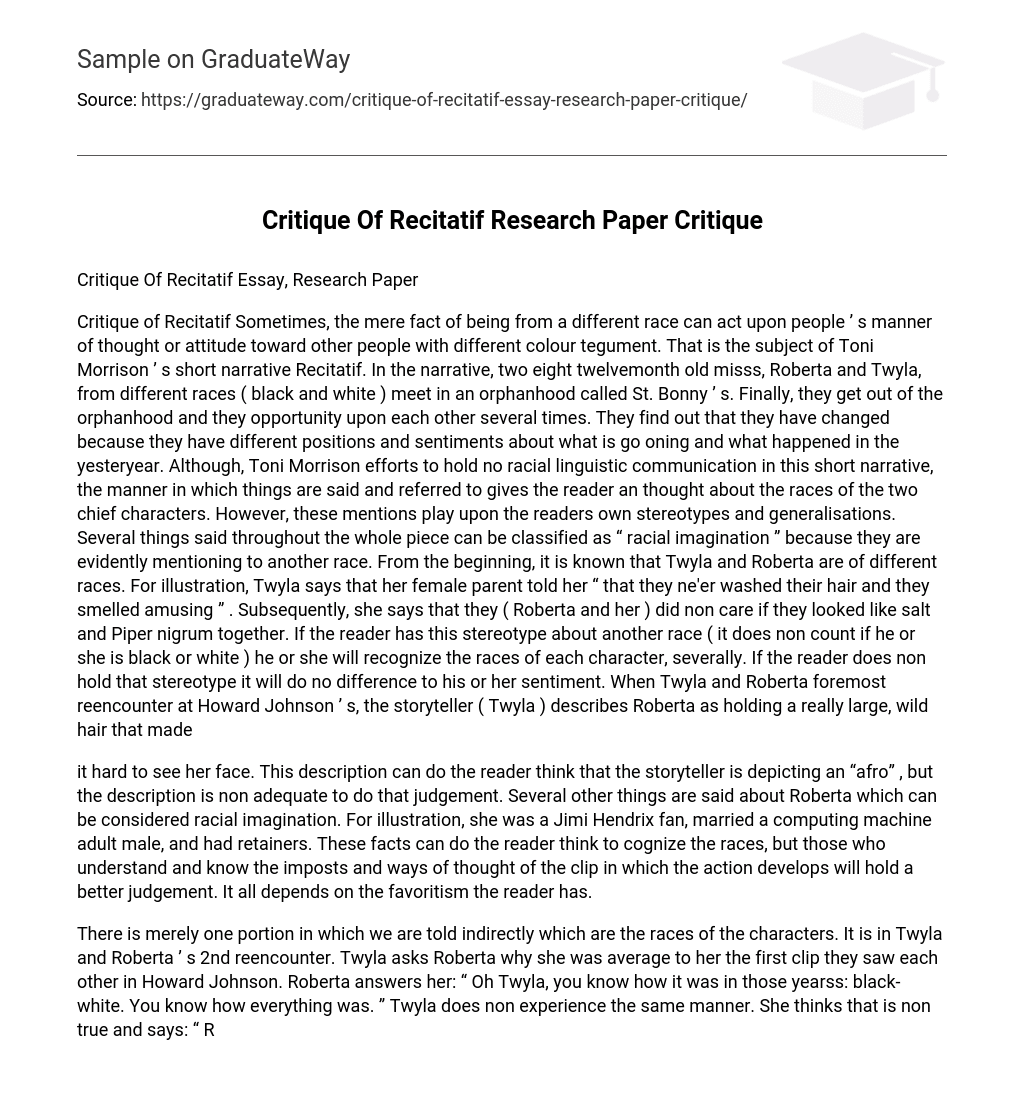Critique Of Recitatif Essay, Research Paper
Critique of Recitatif Sometimes, the mere fact of being from a different race can act upon people ’ s manner of thought or attitude toward other people with different colour tegument. That is the subject of Toni Morrison ’ s short narrative Recitatif. In the narrative, two eight twelvemonth old misss, Roberta and Twyla, from different races ( black and white ) meet in an orphanhood called St. Bonny ’ s. Finally, they get out of the orphanhood and they opportunity upon each other several times. They find out that they have changed because they have different positions and sentiments about what is go oning and what happened in the yesteryear. Although, Toni Morrison efforts to hold no racial linguistic communication in this short narrative, the manner in which things are said and referred to gives the reader an thought about the races of the two chief characters. However, these mentions play upon the readers own stereotypes and generalisations. Several things said throughout the whole piece can be classified as “ racial imagination ” because they are evidently mentioning to another race. From the beginning, it is known that Twyla and Roberta are of different races. For illustration, Twyla says that her female parent told her “ that they ne’er washed their hair and they smelled amusing ” . Subsequently, she says that they ( Roberta and her ) did non care if they looked like salt and Piper nigrum together. If the reader has this stereotype about another race ( it does non count if he or she is black or white ) he or she will recognize the races of each character, severally. If the reader does non hold that stereotype it will do no difference to his or her sentiment. When Twyla and Roberta foremost reencounter at Howard Johnson ’ s, the storyteller ( Twyla ) describes Roberta as holding a really large, wild hair that made
it hard to see her face. This description can do the reader think that the storyteller is depicting an “afro” , but the description is non adequate to do that judgement. Several other things are said about Roberta which can be considered racial imagination. For illustration, she was a Jimi Hendrix fan, married a computing machine adult male, and had retainers. These facts can do the reader think to cognize the races, but those who understand and know the imposts and ways of thought of the clip in which the action develops will hold a better judgement. It all depends on the favoritism the reader has.
There is merely one portion in which we are told indirectly which are the races of the characters. It is in Twyla and Roberta ’ s 2nd reencounter. Twyla asks Roberta why she was average to her the first clip they saw each other in Howard Johnson. Roberta answers her: “ Oh Twyla, you know how it was in those yearss: black-white. You know how everything was. ” Twyla does non experience the same manner. She thinks that is non true and says: “ … inkinesss were really friendly with Whites in those days. ” This is where Toni Morrison fails in accomplishing her end of extinguishing racial linguistic communication, because Twyla is kicking about the yearss when she thought that inkinesss were really friendly with Whites and her friend Roberta was non friendly with her. The characters in Recitatif are credible, but a failing of this reading is that the writer does non do good passages. It is really confusing when you read the duologues because one can easy acquire confused about who is speaking. Even though the writer does non carry through her intent of composing without racial linguistic communication, it is a good and interesting reading, specially for those readers who like readings in which one gets confused about what is go oning.





